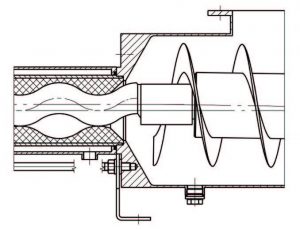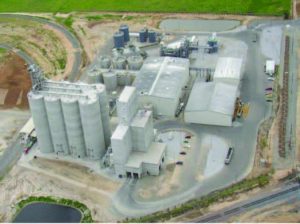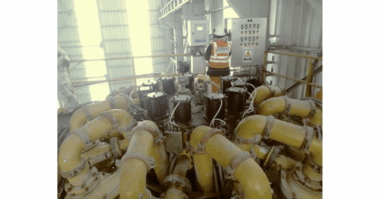NETZSCH pump system for the distillers grain wet cake successfully replaces a conveyer system.
Ethanol fuel is produced from corn, sugar cane, sugar beets, molasses, starch or cellulose with the predominant primary feed stock being corn. Ethanol is a low cost, low carbon and high octane component of gasoline. Currently there is over 10% ethanol in motor fuel.
About 90% of corn ethanol is produced using the dry milling process, and the remainder is by a wet milling process. In dry milling, the corn kernel is ground and made into a slurry with water. In wet milling, the grain is separated through a soaking process and then continues through grinders.
The resulting slurry in both cases goes on to a distillation and fermentation stage that results in the the final product.
At the Pacific Ethanol plant in Madera, California, ethanol fuel is processed from corn where both fermentation and distillation occur. Associated production steps require the handling and transfer of raw materials and co-products. This creates a need for reliable pumps designed to handle materials with varying viscosity, solid contents, and chemicals that can be very corrosive (in a pH range of 2 to 3).
Originally the customer was using a conveyor system and had the drawbacks that are typically associated with open conveyors. Control and containment of the wet cake was difficult, and the presence of liquids in even small amounts could further exacerbate the problems. Loss of product could occur when the conveying system encountered upward or downward gradients. Reliability, maintenance prevention and downtime costs were continual issues.
Flo-Line Technology, a NETZSCH distributor on the west coast addressed the concerns Pacific Ethanol had and closely partnered with them to offer a new system. Engineers at NETZSCH Pumps North America and Flo-Line Technology, worked together to develop a customized pump system to replace the conveyor.
The NETZSCH NEMO NM125 SF size progressing cavity pump emerged as the obvious answer. Prior to the final solution, however, NETZSCH sent a trial pump to Pacific Ethanol so they could test whether the pump was fully capable of pumping the wet cake and to learn what other variables needed to be addressed. This pump was also was helpful in determining the friction loss values to better design the pipeline.
In the application at Pacific Ethanol, the NETZSCH pump transports wet cake consisting of co-product feed materials from the centrifuge process point to the storage barn. From there the product is then transported via trucks.
NETZSCH NEMO pump, load cells, a variable frequency drive (VFD), and the control panel. A temperature control device was also installed to protect the elastomeric stator, and a transducer mon- itored the pressure on the discharge end.
The flow rate was 187 gpm with 35% solids, at a differential pressure of 130 psi. The temperature of the product ranged between 180 and 220 degrees F, and the operating speed was 100 rpm. The system is housed indoors and operates 24 hours per day, 7 days per week.
The flow rate of wet cake is non-uniform, and the wet cake is a dense material. Since this is a contiuous process, one of the key requirements was that the flow rate and speed adjustment needed to be automated. It was essential to use the load cells to monitor the weight of the product flowing into the hopper. When the weight increases, a signal is sent to the VFD which speeds up the pump to move the accumulating product faster. This has to be done continuously to match the flow rate of the product with the optimum speed of the pump.
The key components of the system were the specially designed auger and hopper to ensure the proper handling of the wet cake feed. The auger on this pump was upgraded to 316 stainless steel with 10 mm auger flight thickness for increased corrosion and wear resistance. The protection from corrosion was essential due to low pH value of 2 to 3 at 180 degrees F, along with the presence of ammonia and other chemicals.
This design ensures that the maximum quantity of pumped material is fed into the pump by the feed screw into the stator cavity. The patented positioned feed screw provides a unique advantage for NETZSCH pumps as compared to other progressing cavity pumps. In this application it played a key role in the success of the system by more easily feeding the wet cake into the rotor and stator. In fact, due to the heavy wet cake a special patented positioned feed screw was recommended.
The sizing for the piping and its arrangement was important so as to minimize the line pressure and after detailed friction loss calculations, a 12 inch diameter pipe was specified. The first 90 feet of piping on the discharge side was installed at an incline to a height of 30 feet. This was followed by an additional 90 feet of piping with three (3) drop off points for the wet cake at 30 feet intervals. The total length of pipe from the pump to the furthest point was 180 feet.
The NETZSCH pump solved the challenges faced by the customer’s processing plant with reliability resulting in zero downtime, thereby reducing significant maintenance costs due to lost production. The Pacific Ethanol expectation was that if they could achieve (6) six months of stator life this would be considered a success. The NETZSCH Pump exceeded this target by more than (6) six times. The pump has been operating trouble free with no unscheduled downtime for over three years.
“NETZSCH /Floline wet cake pumping system has operated trouble free from day one with no unscheduled plant shut downs which used to be the norm for the previous mechanical conveyor system,” states Mr. Patrick McKenzie, Engineering Director at Pacific Ethanol. “We are very pleased with system performance which exceeded our expectations and resulted in improved plant reliability and significant revenue increase.”
With the conveyor system, it was not uncommon for Pacific Ethanol to have one or two incidents per year when the plant would have to be shut down for re- pairs. In such a situation, the cost to the plant was significant. A noteworthy sav- ing has been realized for Pacific Ethanol with the installation of the NETZSCH/FloLine Progressing Cavity Pump System since the system has been running without any issues for over three years.






